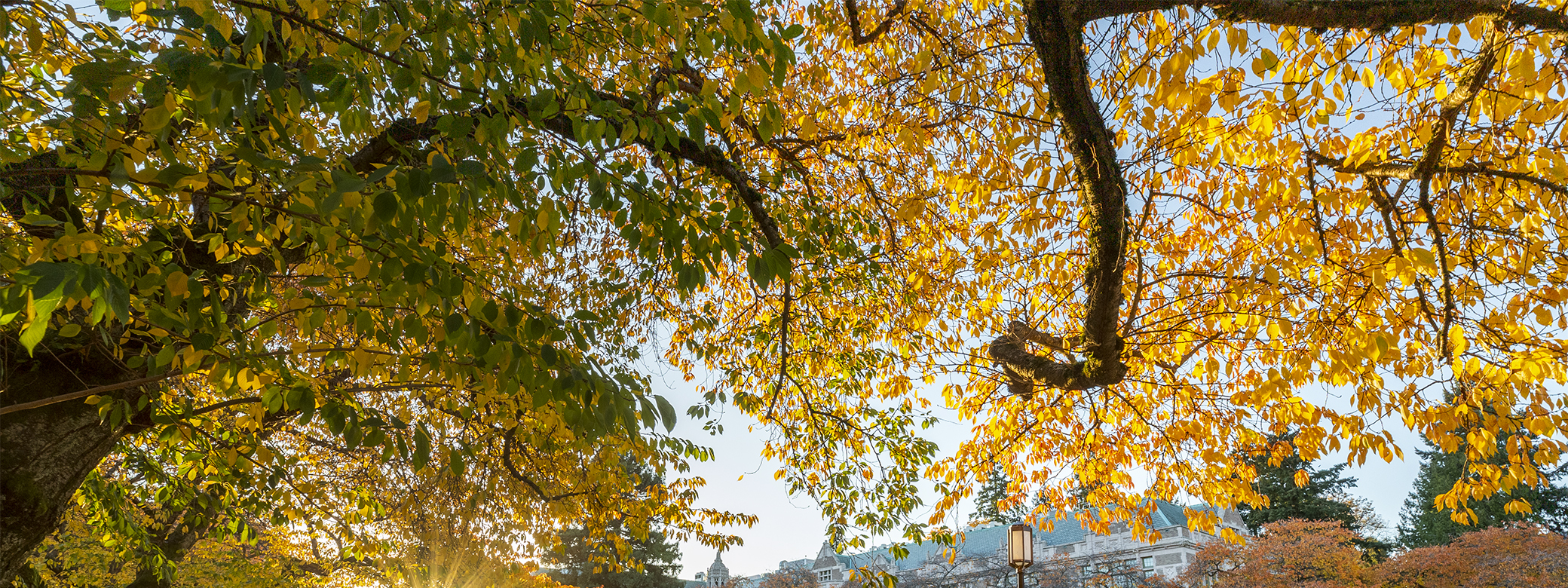The College of Arts & Sciences is pleased to celebrate awards and honors that faculty, staff, and alumni have received over the past few months for their research, leadership, and other accomplishments.
Biology Alum Awarded 2025 Nobel Prize
In early October, Arts & Sciences alumna Mary E. Brunkow (BS, Biology, 1983) was awarded the 2025 Nobel Prize in Physiology or Medicine along with Frederick J. Ramsdell and Shimon Sakaguchi. The three researchers were recognized “for groundbreaking discoveries concerning peripheral immune tolerance that prevents the immune system from harming the body.”
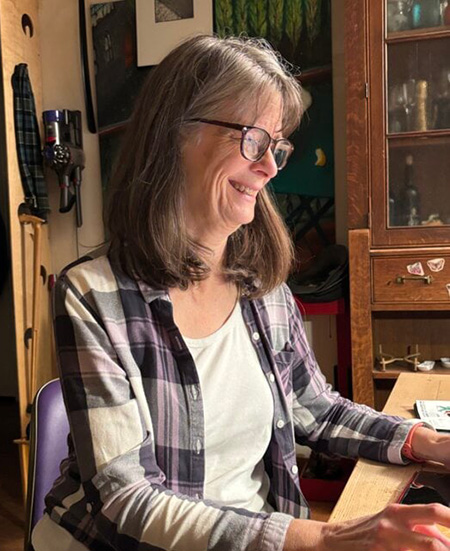
Brunkow, who earned her doctoral degree from Princeton University in 1991, is currently a senior program manager at the Institute for Systems Biology in Seattle. She conducted her Nobel-winning research while working with Ramsdell at Celltech Chiroscience in Bothell, Washington. The two researchers identified a mutation in a gene, foxp3, that makes mice susceptible to a type of skin disorder. Mutations in the human equivalent of the foxp3 gene are also responsible for IPEX syndrome, which has symptoms including intestinal problems, diabetes, and scaly, itchy skin.
Sakaguchi later described the role of the wild-type foxp3 gene in the development of certain white blood cells known as regulatory T cells. These cells, which Sakaguchi discovered, keep other T cells from mistakenly attacking normal tissues. Regulatory T cells also call a cease-fire once the body gets an infection under control.
These findings provided insights into the concept of “peripheral immune tolerance,” which keeps the immune system in check by avoiding autoimmune responses that can damage healthy tissues. The field holds promise in advancing therapies for cancers and autoimmune diseases, and for improvements in treatments to reduce transplant rejection.
Brunkow is the sixth UW alumnus to win a Nobel Prize, after Jeffrey C. Hall, George Hitchings, George Stigler, Martin Rodbell, and Linda B. Buck.
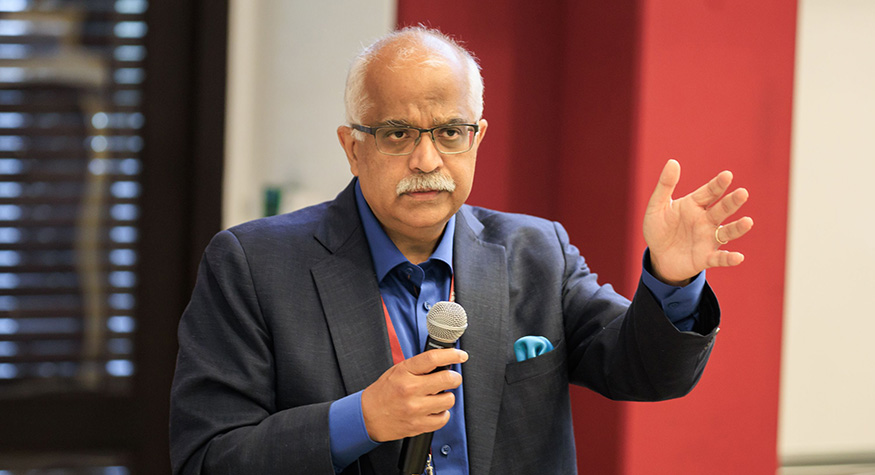
Prakash Recognized for Lifetime Achievement
Aseem Prakash, UW professor of political science and Walker Family Professor in Arts and Sciences, received the 2025 John Gaus Award from the American Political Science Association, which honors “a lifetime of exemplary scholarship in the joint tradition of political science and public administration.” As an integral element of this recognition, Prakash presented the 2025 Gaus Lecture, “Climate Change, Governance Failures, and Public Administration,” at the recent annual conference of the American Political Science Association.
An Arts & Sciences faculty member since 2002, Prakash is founding director of the UW Center for Environmental Politics, which includes more than 45 faculty associates and over 60 graduate and undergraduate fellows. At the global level, he founded the Environmental Politics and Governance (EPG) network.
Prakash is best known for path-breaking research on the role that private actors — including firms and non-governmental organizations — can play in promoting more stringent environmental standards, even in the absence of effective state intervention. His research has helped to bring “environment” into public administration in a variety of ways, including how businesses and NGOs can fill governance gaps. At the same time, he has explored how these nontraditional governance mechanisms could lead to issues such as regulatory capture and accountability deficits. More recently, Prakash has explored different dimensions of climate mitigation and adaptation.
Among Prakash’s extensive publications are eight scholarly books and more than 130 articles in peer-reviewed journals, as well as 180 op-eds and commentaries for the broader public in venues including Forbes.com, Foreign Policy, The Washington Post, Slate, Huffington Post, The Conversation, and The Hill. Google Scholar lists well over 18,000 citations to his work. He is the founding editor of the Cambridge University Press “Business and Public Policy” series as well as the Cambridge Elements “Organizational Response to Climate Change” series. In its annual ranking of scholars in various disciplines, research.com listed Prakash among the top 100 political scientists worldwide.
“We are thrilled that Professor Aseem Prakash, one of our most distinguished scholars, is being honored for lifetime achievement by his peers,” says Andrea Woody, divisional dean of the social sciences. “With groundbreaking contributions to the field of environmental politics, deep and enduring commitment to training the next generation of scholars, and exceptional ability to share his expertise with the public, Prakash has made a lasting impact at the University and in society more broadly.”
Chu Selected as Experimental Physics Investigator
Jiun-Haw Chu, UW professor of physics, is among 22 scientists selected for the 2025 cohort of Experimental Physics Investigators, a distinguished group of mid-career researchers pushing the boundaries of experimental physics.

The Experimental Physics Investigators Initiative was established by the Gordon and Betty Moore Foundation to support creative individuals who have recently received tenure (or its equivalent) and to cultivate collaborative research environments. Each Experimental Physics Investigator receives $1,300,000 over five years. As stated on the initiative webpage, this funding “allows creative individuals to pursue exciting research goals, try new ideas, and explore areas that might not otherwise attract this level and duration of financial support from conventional funding sources.” Investigators are encouraged to tackle interesting new research problems, pivot when necessary, and bring on students and a postdoctoral researchers to accelerate their progress.
Chu joined the UW Arts & Sciences faculty in 2016. His research focuses on discovery and understanding of novel collective behaviors in quantum materials that could revolutionize telecommunications and other fields. His Quantum Materials Lab focuses on crystal growth, thermodynamic and magnetic measurements, and novel experimental techniques using strain engineering tools — which he developed — to explore emergent phases in quantum materials. His research could lead to potential applications in the laboratory, industry, and beyond.
“We are grateful for the Gordon and Betty Moore Foundation’s support of Professor Chu’s work in the design and development of quantum materials within experimental condensed matter physics,” says Daniel Pollack, divisional dean of natural sciences. “He is a world expert in using applied strain to understand complex phenomena in quantum materials. This work is of fundamental importance in physics and also will have practical implications for modern information and energy technologies.”
As a member of the fourth cohort of Experimental Physics Investigators, Chu will have opportunities to connect with other scientists from the current and past cohorts. The Moore Foundation brings all cohorts together annually “to connect investigators and promote the discovery of new ideas and synergistic collaborations,” says Catherine Mader, program officer for the initiative. “We have seen numerous new connections form and new research directions pursued by both individuals and groups based on conversations at these gatherings.”
Million Named 2025 Freedom Scholar
Dian Million (Tanana Athabascan), associate professor of American Indian studies, received a 2025 Freedom Scholar Award from the Marguerite Casey Foundation for “her scholarship and activism in Indigenous feminisms and Indigenous community well-being.” The Freedom Scholar Award honors leading academics whose visionary work advances social and economic justice.
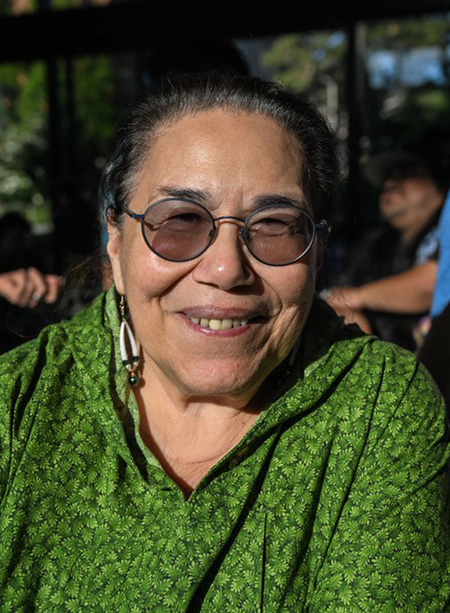
Million is one of four 2025 Freedom Scholar honorees, each receiving a one-time $250,000 award. The Foundation supports leaders, scholars, and initiatives that focus on shifting the balance of power in society, building power for communities that continue to be excluded from shaping how society works and from sharing in its rewards and freedoms.
Million has been teaching in the UW Department of American Indian Studies since 2002 and is an affiliate professor in the Comparative History of Ideas department and Canadian Studies in the Jackson School of International Studies. She is the author of "Therapeutic Nations: Healing in an Age of Indigenous Human Rights" (University of Arizona Press, Critical Issues in Indigenous Studies Series, 2013) as well as numerous articles, chapters, and poems. Million centers her work on questions arising from the violent effects of capitalism/settler colonialism on Indigenous family and community health in North America.
In a UW Daily story about her award, Million shared that the monetary award will help support “different Native community projects that do not usually have access to funds. I will share some part of this award with some smaller groups that need recognition and material help with their projects. I am interested first in advocating for and funding Indigenous women-led projects for health and sovereignty.”
The Freedom Scholar awards were launched in 2020. Previous UW recipients include Megan Ming Francis (2020), G. Alan and Barbara Delsman Associate Professor of Political Science and associate professor of law, societies, and justice; Angélica Cházaro (2021), Charles I. Stone Professor of Law; and Chandan Reddy (2023), associate professor of gender, women & sexuality studies and of comparative history of ideas
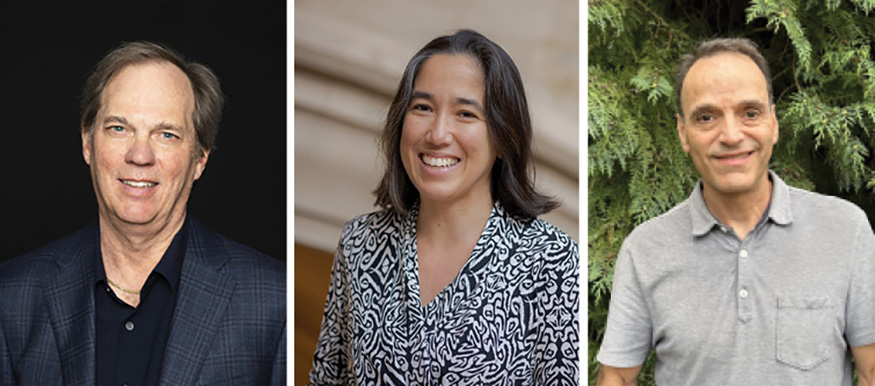
Arts & Sciences Faculty Elected to Washington State Academy of Sciences
Three faculty members from the UW College of Arts & Sciences were elected to the Washington State Academy of Sciences in July. They are among 36 scientists and educators from across the state — including 12 from the UW — elected as new members. Election recognizes the new member’s “outstanding record of scientific and technical achievement and willingness to assist the Academy in providing the best available scientific information and technical understanding to inform complex policy decisions in Washington.”
The three Arts & Sciences faculty members are:
Horacio de la Iglesia, professor of biology, for “internationally recognized leadership in the biology of sleep, including groundbreaking research on molecular and genetic aspects of the brain, human behavioral studies on learning under varied sleep schedules, and contributions that have shaped policy on school schedules and standard time.”
Kai-Mei Fu, the Virginia and Prentice Bloedel professor of physics and of electrical & computer engineering, for “foundational contributions to fundamental and applied research on the optical and spin properties of quantum point defects in crystals and for service and leadership in the quantum community.”
David Hertzog, the Arthur B. McDonald professor of physics and director of the Center for Experimental Nuclear Physics and Astrophysics. Hertzog currently leads a group conducting high-precision experiments involving the muon, a fundamental subatomic particle, and was a founding co-spokesperson for the Muon g-2 experiment at the U.S. Department of Energy’s Fermi National Accelerator Laboratory.
More Awards & Honors
Briana Abrahms, associate professor of biology, was awarded the Humboldt Research Fellowship for Experienced Researchers. The fellowship enables highly qualified scholars to conduct research over extended periods in Germany.
Paul S. Atkins, professor of Asian languages and literature, received the 28th Yamagata Bantō Prize by Osaka Prefecture in recognition of his book "Teika: The Life and Works of a Medieval Japanese Poet" and his wider scholarly contributions. The Yamagata Prize honors individuals whose work has significantly advanced the introduction of Japanese culture overseas and promoted international understanding.
Bianca Dang, assistant professor of history, was awarded a prize from the Latin American Studies Association, Haiti/Dominican Republic section, for her article "’I Don’t Know what will be my Lot’: Transnational Migration and Unfree Labor in Early America." The article appeared in The Journal of the Civil War Era.
Nadine Fabbi, director of the Canadian Studies Center and acting assistant professor in the Jackson School of International Studies, was awarded the 2025 Donner Medal in Canadian Studies from the Association for Canadian Studies in the United States for distinguished achievement, scholarship, and program innovation in the area of Canadian Studies in the United States.
Michael Gelb, Boris and Barbara L. Weinstein Endowed Chair in Chemistry, received the 2025 Harry Hannon Laboratory Improvement Award in Newborn Screening from American Public Health Laboratories. The award honors those who have made significant contributions related to improving the detection of newborn disorders/conditions.
Russell Hugo, director of the UW Language Learning Center and affiliate assistant professor of linguistics, received the 2025 Marie Sheppard Memorial Award from The International Association for Language Learning Technology. The award recognizes individuals whose research and work in the field shows promise for future publications.
Xiaosong Li, College of Arts & Sciences associate dean for research and Larry R. Dalton Endowed Chair in Chemistry, is part of an interdisciplinary team of Beckman Institute for Advanced Science and Technology researchers that received a $2 million National Science Foundation grant to develop highly efficient electronic and energy materials by controlling electron spin observed in photosynthetic systems.
Whitney Lynn, associate professor of photo/media + new genres in the School of Art + Art History + Design, is the recipient of a VIA Art Fund 2025 Artistic Production grant for an exhibition, “Atomic Open House,” to be presented in spring 2026 by Black Cube Nomadic Art Museum. VIA Art Fund patrons partner with artists, curators, and cultural institutions around the world to support innovative artistic endeavors in various forms.
Anne B. McCoy, Natt-Lingafelter Professor of Chemistry, was selected as the Journal of Molecular Spectroscopy Special Review Lecturer, an honor presented by the Journal of Molecular Spectroscopy.
Helen O'Toole, professor of painting + drawing in the School of Art + Art History + Design, was selected as one of three artists-in-residence at the Siena Art Institute in Italy for Fall 2025. Through the residency, O'Toole is living and working in Siena, drawing inspiration from the city and its surroundings and engaging with the local community through public talks and open studios.
Aditya Ramesh, assistant professor of history, won the Joel A. Tarr Envirotech Prize for his article “From Irrigation to Hydropower: The Political Economy of a Multipurpose Reservoir in Interwar South India,” published in Capitalism: A Journal of History and Economics. The prize, awarded to the best article on the relationship between technology and environmental history, was established by Envirotech in association with the Society for the History of Technology and the American Society for Environmental History to recognize innovative scholarship.
Gray Rybka, professor of physics, was elected Fellow of the American Physical Society, for “leadership in searches for axion dark matter, achieving unprecedented sensitivity to the more important axion models, and for the development of ultra-sensitive instrumentation enabling experiments such as neutrino mass measurements.”
Carly Sheehan, lecturer in painting + drawing in the School of Art + Art History + Design, was selected for a Surf Point Residency in Maine. Surf Point is a nonprofit that supports diverse visual artists and art workers through a residency, stewards 46 acres, hosts public programs, and more.
Kim Van Someren, instructional technician in printing and in painting + drawing in the School of Art + Art History + Design, received the 2025 Golden Brayer Award from Seattle Print Art, a new annual award that highlights individuals across the Pacific Northwest who go above and beyond in support of printmaking. Earlier this year, Van Someren was elected Vice President of the Southern Graphics Council International, the largest print organization in North America.
Alexandra Velian, associate professor of chemistry, has been selected to receive a 2026 WCC Rising Star Award from the Women Chemists Committee of the American Chemical Society. This award recognizes exceptional women scientists approaching mid-level careers who have demonstrated outstanding promise for contributions to their respective fields. Honorees will present their work in a talk at the ACS Spring 2026 Meeting.
Endowed Appointments
Jared Alper, professor of mathematics, was appointed to the Walker Family Endowed Professorship in Mathematics.
Catherine Connors, professor of classics and adjunct professor in gender, women and sexuality studies, was appointed to the Daniel P. Harmon Endowed Professorship for the Classics.
Dianne Harris, dean of College of Arts & Sciences and professor of history, was named the inaugural Katherine and John Simpson Endowed Dean in the College of Arts & Sciences.
Sravanthi Kollu, assistant professor of Asian languages and literature, was appointed to the Hanuma and Anuradha Kodavalla Endowed Chair in Telugu.
Jasmine Mahmoud, assistant professor of theatre history and performance studies in the School of Drama, was appointed to the Donald E. Petersen Endowed Professorship.
Monica Rojas-Stewart, assistant professor of dance, was appointed to the Floyd and Delores Jones Endowed Professorship in the Arts.
Christopher Tounsel, associate professor of history, was appointed to the Walker Family Endowed Professorship in History.
Adam Warren, professor of history and chair of the Department of History, was appointed to the Williams Family Endowed Professorship in History.
Glennys Young, professor of history and of international studies, was appointed to the Howard and Frances Keller Endowed Professorship in History.
More Stories
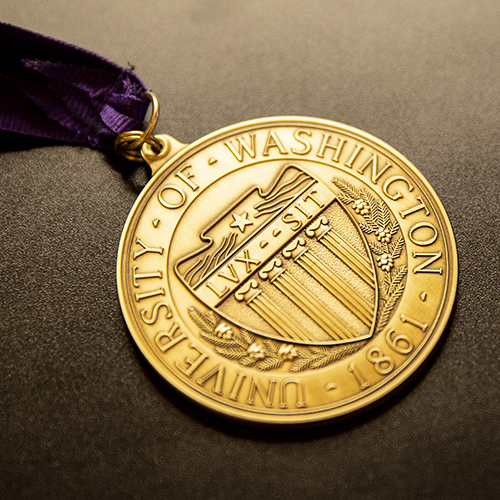
2025 UW Awards of Excellence
Arts & Science faculty and staff were among the recipients of 2025 UW Awards of Excellence for their teaching, leadership, and innovation.
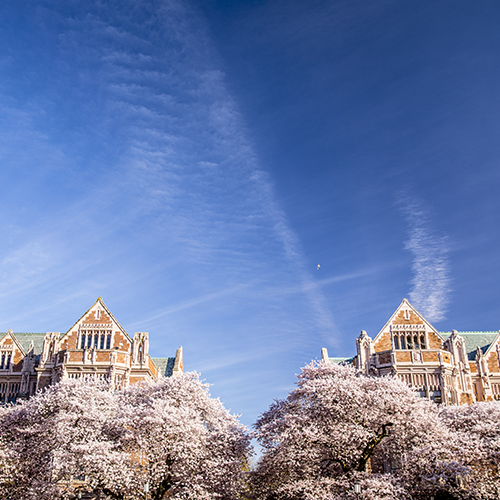
Meet Our 2025 Graduate Medalists
Meet the four graduating students selected by the College of Arts & Sciences as 2025 Graduate Medalists for their accomplishments.
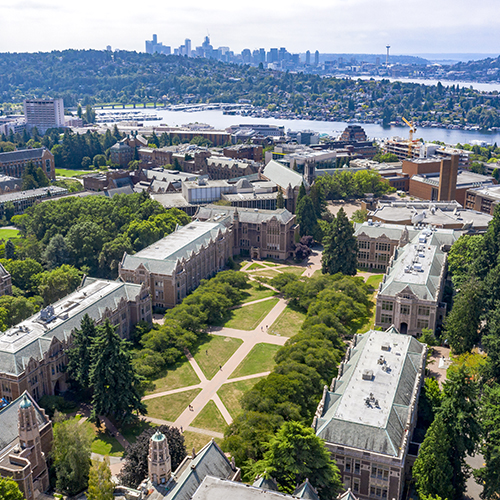
Honors for Impact, Innovation & More
Recent awards celebrate Arts & Sciences faculty, staff, and students for their research, leadership, and more.
